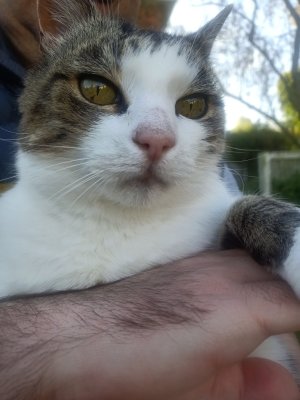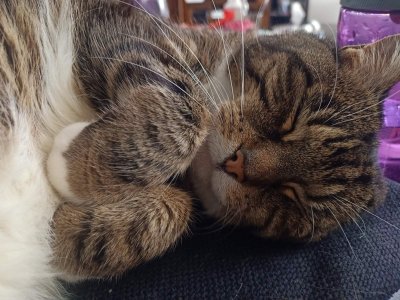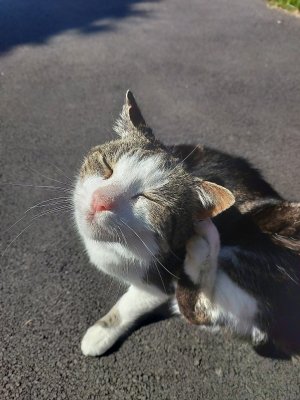You are using an out of date browser. It may not display this or other websites correctly.
You should upgrade or use an alternative browser.
You should upgrade or use an alternative browser.
Cats and Kittens
- Thread starter Azem.Ocram
- Start date
bernie14
Filter Manipulator

Hail to the queen!!! This cat's name IS Queenie!
Dexter helping to make the bed. He jumped under the bottom sheet, then the top one then the bottom duvet then the top one.
No blood drawn.
View attachment 628500
Our human didn't put the heat pump on this morning. We don't like each other but truce?
View attachment 628501
Cats really, really like to jump under descending bed sheets.
No idea why.
There was some major snoring going on here earlier today.
Normally I'd be in bed in the morning, but actually stayed up last night due to getting so absorbed in a computer game that by the time I realized that I had to place a grocery order this morning (has to be done before noon), it just made more sense to stay up than go to sleep for 3 hours.
I was still tired, so I ended up dozing in front of the computer... and Maddy figured that it would be a great idea to crawl into my arms, curl up, and go to sleep as well.
I was awakened by the loudest snoring I've ever heard from her. That was one very emphatic power nap she took, and of course I didn't move an inch. Unless it's an emergency, you NEVER disturb a sleeping cat.
Normally I'd be in bed in the morning, but actually stayed up last night due to getting so absorbed in a computer game that by the time I realized that I had to place a grocery order this morning (has to be done before noon), it just made more sense to stay up than go to sleep for 3 hours.
I was still tired, so I ended up dozing in front of the computer... and Maddy figured that it would be a great idea to crawl into my arms, curl up, and go to sleep as well.
I was awakened by the loudest snoring I've ever heard from her. That was one very emphatic power nap she took, and of course I didn't move an inch. Unless it's an emergency, you NEVER disturb a sleeping cat.
Cats know when you are talking to them, know friends from strangers, and behave differently compared to when we are talking to other humans
In contemporary western cultures, most humans talk to their pet companions. Speech register addressed to companion animals shares common features with speech addressed to young children, which are distinct from the typical adult-directed speech (ADS). The way dogs respond to dog-directed speech (DDS) has raised scientists’ interest. In contrast, much less is known about how cats perceive and respond to cat-directed speech (CDS). The primary aim of this study was to evaluate whether cats are more responsive to CDS than ADS. Secondarily, we seek to examine if the cats’ responses to human vocal stimuli would differ when it was elicited by their owner or by a stranger. We performed playback experiments and tested a cohort of 16 companion cats in a habituation–dishabituation paradigm, which allows for the measurement of subjects’ reactions without extensive training. Here, we report new findings that cats can discriminate speech specifically addressed to them from speech addressed to adult humans, when sentences are uttered by their owners. When hearing sentences uttered by strangers, cats did not appear to discriminate between ADS and CDS. These findings bring a new dimension to the consideration of human–cat relationship, as they imply the development of a particular communication into human–cat dyads, that relies upon experience. We discuss these new findings in the light of recent literature investigating cats’ sociocognitive abilities and human–cat attachment. Our results highlight the importance of one-to-one relationships for cats, reinforcing recent literature regarding the ability for cats and humans to form strong bonds.
In contemporary western cultures, most humans talk to their pet companions. Speech register addressed to companion animals shares common features with speech addressed to young children, which are distinct from the typical adult-directed speech (ADS). The way dogs respond to dog-directed speech (DDS) has raised scientists’ interest. In contrast, much less is known about how cats perceive and respond to cat-directed speech (CDS). The primary aim of this study was to evaluate whether cats are more responsive to CDS than ADS. Secondarily, we seek to examine if the cats’ responses to human vocal stimuli would differ when it was elicited by their owner or by a stranger. We performed playback experiments and tested a cohort of 16 companion cats in a habituation–dishabituation paradigm, which allows for the measurement of subjects’ reactions without extensive training. Here, we report new findings that cats can discriminate speech specifically addressed to them from speech addressed to adult humans, when sentences are uttered by their owners. When hearing sentences uttered by strangers, cats did not appear to discriminate between ADS and CDS. These findings bring a new dimension to the consideration of human–cat relationship, as they imply the development of a particular communication into human–cat dyads, that relies upon experience. We discuss these new findings in the light of recent literature investigating cats’ sociocognitive abilities and human–cat attachment. Our results highlight the importance of one-to-one relationships for cats, reinforcing recent literature regarding the ability for cats and humans to form strong bonds.
I use CDS when talking to my cat. Sort of akin to how you might address a baby or small child. I seem to remember reading that they distinguish this higher pitched human voice better than ADS as they know it is directed at them. My cat also recognises its names. I have 2 cats - Harpo and Groucho (named after the Marx brothers). I have lengthened one name to Harpsico which is phonetically quite different. But he answers to both. The other one has a bit of a flatulence problem (he farts a lot). So I call him Stinky. And he also answers to both Groucho and stinky now. Which again is phonetically quite a different sound. I suspect this indicates that cats might not necessarily distinguish what their name is. But rather the way one particular human might address them. And they recognise the same sound and know that I am addressing them.Cats know when you are talking to them, know friends from strangers, and behave differently compared to when we are talking to other humans
In contemporary western cultures, most humans talk to their pet companions. Speech register addressed to companion animals shares common features with speech addressed to young children, which are distinct from the typical adult-directed speech (ADS). The way dogs respond to dog-directed speech (DDS) has raised scientists’ interest. In contrast, much less is known about how cats perceive and respond to cat-directed speech (CDS). The primary aim of this study was to evaluate whether cats are more responsive to CDS than ADS. Secondarily, we seek to examine if the cats’ responses to human vocal stimuli would differ when it was elicited by their owner or by a stranger. We performed playback experiments and tested a cohort of 16 companion cats in a habituation–dishabituation paradigm, which allows for the measurement of subjects’ reactions without extensive training. Here, we report new findings that cats can discriminate speech specifically addressed to them from speech addressed to adult humans, when sentences are uttered by their owners. When hearing sentences uttered by strangers, cats did not appear to discriminate between ADS and CDS. These findings bring a new dimension to the consideration of human–cat relationship, as they imply the development of a particular communication into human–cat dyads, that relies upon experience. We discuss these new findings in the light of recent literature investigating cats’ sociocognitive abilities and human–cat attachment. Our results highlight the importance of one-to-one relationships for cats, reinforcing recent literature regarding the ability for cats and humans to form strong bonds.
When I adopted and tamed a feral kitten in the '90s, I decided to name him Gussy. Training him to recognize his name involved teaching him to associate it with things he liked - food, going out or coming in, and lots of cuddles. It worked.I use CDS when talking to my cat. Sort of akin to how you might address a baby or small child. I seem to remember reading that they distinguish this higher pitched human voice better than ADS as they know it is directed at them. My cat also recognises its names. I have 2 cats - Harpo and Groucho (named after the Marx brothers). I have lengthened one name to Harpsico which is phonetically quite different. But he answers to both. The other one has a bit of a flatulence problem (he farts a lot). So I call him Stinky. And he also answers to both Groucho and stinky now. Which again is phonetically quite a different sound. I suspect this indicates that cats might not necessarily distinguish what their name is. But rather the way one particular human might address them. And they recognise the same sound and know that I am addressing them.
Almost all the cats I've ever had have had an official name that I normally call them, plus a nickname.
One cat chose his own name (I've told the story of Tomtat, and how he decided he would answer either to that name or at least the "'tat" part of it). My grandmother tried for years to get him to answer to "Tommy" and he never would.
Narz
keeping it real
Gf's mum's cat (1 of 5, the fattest & friendliest/purryist)
Last edited:
It was 7 years ago today that our Caboose was found outside a dumpster at work (he was barely 6 weeks old) and I brought him home.

I would imagine his fur feels like velvet. He's a handsome cat, and his coloring reminds me of my Gussy.It was 7 years ago today that our Caboose was found outside a dumpster at work (he was barely 6 weeks old) and I brought him home.
View attachment 644592
His fur is not as soft as it might appear. It is somewhat coarse. One of our other cats (a grey tabby) has so so soft fur, I want it for slippers!I would imagine his fur feels like velvet. He's a handsome cat, and his coloring reminds me of my Gussy.
Do not let the cat hear you say that, they know you are talking about them!!!One of our other cats (a grey tabby) has so so soft fur, I want it for slippers!
Zardnaar
Deity
Maddy just tried to steal my saskatoon pie. Fortunately it was still in its closed container and she was unable to open it in time to cause a mess.
Zardnaar
Deity
It was 7 years ago today that our Caboose was found outside a dumpster at work (he was barely 6 weeks old) and I brought him home.
View attachment 644592
So so cute.
Reminds me of my cat rescue last year
 .
.Zardnaar
Deity
Zardnaar
Deity
Wy, of course yu can has sunbeam. An' a hug an' pet, too.
Zardnaar
Deity
Wy, of course yu can has sunbeam. An' a hug an' pet, too.
He got lots of pats and affection. We both sat down beside him and patted away.
Then it got to hot he headed for the shade over his patting/headbop perch.
Narz
keeping it real
I miss my cats (I gave them to a good home when I left the country, they still send pics)
Neighbors have seven cats, I always see them in the window, what a tease but gf's dad (who we're living with) doesn't want any pets
but gf's dad (who we're living with) doesn't want any pets
Neighbors have seven cats, I always see them in the window, what a tease
 but gf's dad (who we're living with) doesn't want any pets
but gf's dad (who we're living with) doesn't want any petsSimilar threads
- Replies
- 33
- Views
- 749
- Replies
- 78
- Views
- 2K





